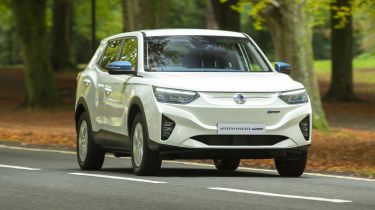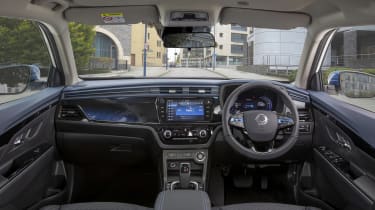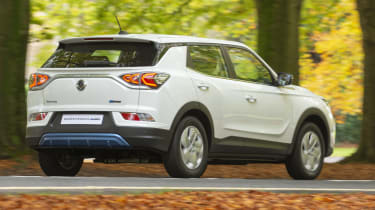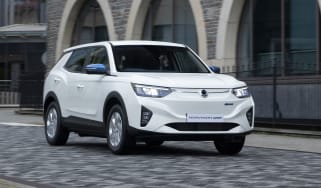SsangYong Korando e-Motion review
The first electric SsangYong has arrived, offering a good chunk more practicality than its fellow budget-minded EVs, yet it can’t match the cabin quality and range of rivals
Pros
- Good practicality
- Seven-year warranty
- Plenty of standard equipment
Cons
- Range falls far short of rivals
- Central touchscreen
- Poor cabin quality
| Car type | Range | Wallbox charge time | Rapid charge time |
|---|---|---|---|
| Electric | 211 miles | 10hrs (0-100%, 7.4kW) | 41mins (10-80%, 100kW) |
SsangYong wil have launched three new electric models by 2025, all likely to be SUVs. A zero-emissions version of the all-new Torres will be with us by the end of 2023, but right now there's this: the Qashqai-sized Korando e-Motion.
This isn’t an all-new car, however: the current-generation Korando has been around since 2019 with petrol and diesel power, rivalling the Hyundai Tucson, Kia Sportage and Peugeot 3008, among others. In electric form, the e-Motion faces off against the more budget-minded EVs, such as the MG ZS EV, as well as MG 5 SW estate, Hyundai Kona Electric, Kia e-Niro and Vauxhall Mokka-e.
The Korando e-Motion has a relatively large 61.5kWh battery, 55.3kWh of which is usable, offering a claimed maximum range of 211 miles. In comparison, the top-spec versions of the e-Niro and Kona Electric use a 64kWh battery, but can easily cover close to 300 miles on a charge. Then, there’s the SsangYong’s performance: with 188bhp and 360Nm of torque on tap from a single electric motor driving the front wheels, 0-62mph takes nine seconds, although that is on par with many of its rivals.
The e-Motion also gets 100kW rapid-charging capability as standard, which means a 10-80% top-up from a fast enough charging point will take just over 40 minutes, while fully recharging the 61.5kWh battery using a standard 7.4kW home wallbox will take 10 hours.
Those are pretty par-for-the-course numbers these days, but one area where the Korando bests rivals with ease is practicality. The compact SUV hasn’t lost any interior space in the switch to electric power and feels extremely spacious up front. It’s capable of accommodating four six-footers in comfort and the 551-litre boot is a full 100 litres up on both the e-Niro, and over 200 litres more than the Kona Electric offers.
Overall, the e-Motion’s cabin is functional, with physical switches and rotary controls on the steering wheel and dashboard, while the 12.3-inch digital driver’s display is not only sharp, but features some pretty slick graphics as well. The central touchscreen, on the other hand, is slow to respond, and because it’s integrated into the dashboard, far away from the driver, it felt out of reach during our time behind the wheel.
As a result, the laggy setup forces you to take your eyes off the road as you operate it. What’s more, on our test drive, the entire infotainment system froze and spent a good few minutes rebooting. Meanwhile, the picture from the remarkably high-res reversing camera was extremely clear, but because of its low angle view, it doesn’t show you a lot of your surroundings.
The car felt well screwed together, however material quality is much less of a plus point. There’s a little too much piano-black plastic for our taste, given how easily it tends to scratch, and some other bits like the chrome doorhandles and indicator and wiper stalks feel very cheap when you touch them.
On the road, the electric Korando provides a fairly forgettable driving experience. It’s by no means horrendous, but it won’t dazzle you, either. The motor offers typical EV ‘oomph’, delivering strong 0-30mph performance around town and plenty of power to get you up to cruising speed with ease. There are three modes for the regenerative braking, which you can adjust using paddles on the steering wheel, although none are strong enough for one-pedal driving. On occasion, we found the car reset the amount of regen to the weakest mode for no apparent reason, which was very irritating around town.
When you push the Korando more, there isn’t that much of an EV whine, but once you go beyond walking pace, any noise it does emit is drowned out by road roar from the tyres. The Korando is far from the quietest or most refined electric car we’ve experienced, but it’s a damn sight better in this respect than its combustion-engined counterparts and a world away from SsangYong’s diesel-engined models.
Ultimately, the car is happiest at relatively low speeds, where the suspension does a good job of keeping the tall body in check over all but the worst potholes and cracks. Once you get out of town, though, the Korando struggles to keep its body under control during faster changes of direction and over rougher surfaces. The bigger issue, however, is the amount of play in the steering, which didn’t inspire confidence. We’d advise adopting a more relaxed driving style and sticking with either Eco or Normal mode, opposed to the rather pointless Sport setting, as these will reward you with a steady, uneventful drive.
It’s also worth noting that during our time with the car covering a mix of slow suburban and faster country roads, as well as a short motorway squirt, the e-Motion reported energy consumption of 3.3 miles per kWh – enough for a real-world range of around 180 miles based on the useable battery capacity. Again, those inclined to keep the SsangYong in speed-limited Eco mode, or stick mainly to urban routes, are likely to exceed that figure.
There’s a choice of three trim levels with the Korando e-Motion: ELX, Venture and Ultimate, with the entry-level version starting from just over £30,000 after the plug-in car grant (PiCG) has been deducted. Standard equipment includes 17-inch alloys, an eight-inch touchscreen with Apple CarPlay and Android Auto, a 12.3-inch driver’s display and a reversing camera, as well as safety systems like autonomous emergency braking, lane-keeping assistance and speed-limit warnings. Plus, you get SsangYong’s seven-year/90,000-mile warranty on top of all that.
Upgrading to mid-range Venture trim (just under £35,000) adds LED headlights, faux-leather upholstery, heated front seats, a larger 9.2-inch touchscreen, rear parking sensors, leather steering wheel and a charging cable. Finally, the range-topping Ultimate (just under £38,000) features a powered tailgate, front and rear parking sensors, a heat pump and wireless phone charging, as well as power-adjustable and ventilated front seats, plus heated rear seats. Neither Venture nor Ultimate is eligible for the plug-in grant.
Ultimately, while it boasts significantly more cabin and boot space than its similarly priced rivals, the Korando e-Motion doesn’t excel when it comes to interior quality or driving experience. That said, potential customers may find that the generous amount of standard equipment and lengthy warranty are enough to seal the deal.








